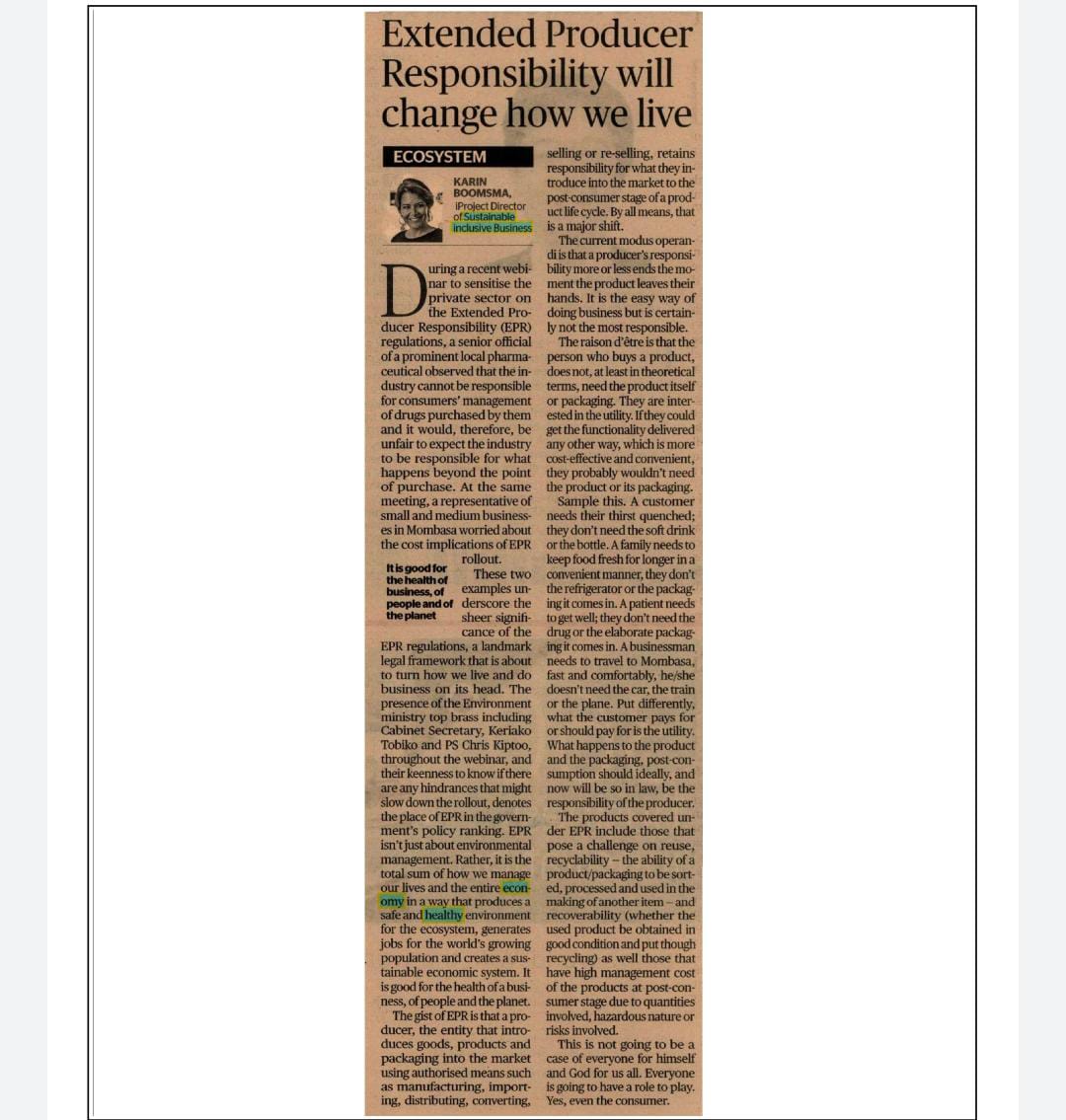By Karin Boomsma
During a recent webinar to sensitise the private sector on the Extended Producer Responsibility (EPR) regulations, a senior official of a prominent local pharmaceutical observed that the pharmaceutical industry cannot be responsible for consumers’ management of drugs purchased by them and it would therefore be unfair to expect the industry to be responsible for what happens beyond the point of purchase. At the same meeting, a representative of small and medium businesses in Mombasa, worried about the cost implications of EPR rollout on small and medium enterprises.
The two examples mentioned above underscore the sheer significance of the EPR regulations, a landmark legal framework that is about to turn how we live and do business on its head. The presence of the Ministry of Environment and Forestry top brass including Cabinet Secretary, Keriako Tobiko and Principal Secretary, Dr. Chris Kiptoo, throughout the webinar, and their keenness to know if there are any hindrances that might slow down the rollout, denotes the place of EPR in government’s policy ranking.
EPR isn’t just about environmental management. Rather, it is the total sum of how we manage our lives and the entire economy in a way that produces a safe and healthy environment for the ecosystem, generates jobs for the world’s growing population and creates a sustainable economic system. It is good for the health of business, of people and of the planet.
The gist of EPR is that a producer, the entity that introduces goods, products and packaging into the market using authorised means such as manufacturing, importing, distributing, converting, selling or re-selling, retains responsibility for what they introduce into the market all the way to the post-consumer stage of a product life cycle. By all means, that is a major shift. The current modus operandi is that a producer’s responsibility more or less ends the moment the product leaves their hands. It is the easy way of doing business but is certainly not the most responsible. The raison d’être is that the person who eventually purchases a product, does not, at least in theoretical terms, need the product itself or the packaging. They are interested in the utility. If they could get the functionality delivered any other way, which is more cost effective and convenient, they probably wouldn’t need the product or its packaging.
Sample this. A customer needs their thirst quenched; they don’t need the soft drink or the bottle. A family needs to keep food fresh for longer in a convenient manner; they don’t the refrigerator or the packaging it comes in. A patient needs to get well; they don’t need the drug or the elaborate packaging it comes in. A businessman needs to travel to Mombasa, fast and comfortably; he/she doesn’t need the car, the train or the airplane. Put differently, what the customer pays for or should pay for is the utility. What happens to the product and the packaging, post consumption should ideally, and now will be so in law, be the responsibility of the producer.
The products covered under EPR include those that pose a challenge on reuse, recyclability (the ability of a product/packaging to be sorted, processed and used in the making of another item) and recoverability (whether the used product be obtained in good condition and put though recycling) as well those that have high management cost of the products at post-consumer stage due to quantities involved, hazardous nature or risks involved.
This is not going to be a case of everyone for himself and God for us all. Everyone is going to have a role to play. Yes, even the consumer. So, for that pharmaceutical executive who worried about consumer behaviour and the small business representative who was concerned about cost, perhaps it will encourage them to know that they aren’t alone. As a matter of fact, every sector or every line of business will have what is known as a Producer Responsibility Organisation (PRO), a membership organization set up to assume legal obligation for implementation of the Extended Producer Responsibility on behalf of its members in a Collective compliance scheme. The members will only pay a certain amount of money required by law or by themselves through their PRO.
The PRO will not take away the producer responsibility for better designs, for innovation and for doing business according to the dictates of the law, but it will be of great help to have someone who bears overall responsibility for executing EPR obligations on behalf of its members. Among others, a PRO shall be responsible for organising and managing the collection, sorting, material recovery, recycling, treatment and end of life management of its members’ products. It shall also undertake market development for the secondary raw materials of the products. To ensure accountability, it shall hold an annual members’ meeting to deliberate on the progress and performance of the PRO, governance, management and administrative systems.
EPR is a new legislation; the way to implement, organise and drive this in the best way is yet to be designed. Together.
The future is EPR. Familiarise yourself. So we can drive the change together.
Boomsma is Project Director of Sustainable inclusive Business.


